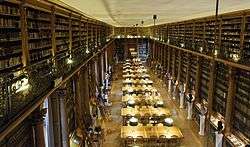library
English

Etymology
Middle English librarie, from Anglo-Norman librarie, from Old French librairie, from Latin librarium (“bookcase, chest for books”), from librarius (“concerning books”), from liber (“the inner bark of trees, paper, parchment, book”), probably derived from a Proto-Indo-European base *leub(h) (“to strip, to peel”). Displaced native Middle English bochus, bochous (“library, bookhouse”) (from Old English bōchūs (“library, bookhouse”)). Romance cognates often mean “bookshop” instead: French librairie, Italian libreria, and Portuguese livraria. This is a recent innovation (16th century in French), displacing earlier sense.
Pronunciation
- (UK)
- (Received Pronunciation) IPA(key): /ˈlaɪbɹəɹi/
- (nonstandard) IPA(key): /ˈlaɪbəɹi/, /ˈlaɪbɹi/
- (US)
- (General American) IPA(key): /ˈlaɪˌbɹɛɹi/, /ˈlaɪbɹəɹi/
- (nonstandard) IPA(key): /ˈlaɪˌbɛɹi/
Audio (US) (file) Audio (file)
The nonstandard UK pronunciation /ˈlaɪbɹi/ (whence the eye dialect spelling libry) exhibits haplology.
Noun
library (plural libraries)
- An institution which holds books and/or other forms of media for use by the public or qualified people often lending them out, as well as providing various other services for its users.
- (by extension) Any institution that lends out its goods for use by the public or a community.
- A collection of books or other forms of stored information.
- 1896, Alfred Newton, A Dictionary of Birds, page 71:
- A small library of books has been written on the subject.
-
- An equivalent collection of analogous information in a non-printed form, e.g. record library.
- (computer science) A collection of software subprograms that provides functionality, to be incorporated into or used by a computer program.
- A collection of DNA material from a single organism or relative to a single disease.
- (card games) The deck or draw pile.
- 1994, The Magic, the Gathering: Pocket Players' Guide, →ISBN, page 167:
- At the conclusion of every duel, each player must show the remaining cards in his or her hand to the opponent to verify that no Restricted List duplicate cards appear there (e.g., to prove that a second Time Walk wasn't drawn from his library).
- 2006, Michael J. Flores, Deckade: 10 Years of Decks, Thoughts, and Theory!, →ISBN, page 228:
- But why did very good players shy away from cards that are so obviously good from our perspectives? One very real possibility is that library manipulation/increased selection and redundancy tech had not yet been established - after all, many players were amazed at Lestree's use of the Sylvan Library to draw extra cards!
- 2006, John Kaufeld & Jeremy Smith, Trading Card Games For Dummies, →ISBN, page 50:
- To win a game of Magic, you must achieve one of two chief goals: either be the first to reduce your opponent's life total from 20 to 0, or force him or her to attempt to draw a card from his or her library when there are no cards left in it.
- 2010, Shirley R. Steinberg, Michael Kehler, & Lindsay Cornish, Boy Culture: An Encyclopedia, →ISBN, page 418:
- The deck becomes the draw pile, also called the library, from which each player repeatedly draws cards for his or her own hand, cards that are gradually included into the game.
- 2010, Zhigeng Pan, Maiga Chang, & Adrian David Cheok, Transactions on Edutainment III, →ISBN, page 119:
- At this phase, most of TCGs only allow players drawing card(s) from a pack which is also called library or deck.
-
Synonyms
- (institution): bookhouse (nonstandard)
Derived terms
Descendants
Translations
|
|
|
|
|
|
|
|
|
|
- The translations below need to be checked and inserted above into the appropriate translation tables, removing any numbers. Numbers do not necessarily match those in definitions. See instructions at Wiktionary:Entry layout#Translations.
|
|